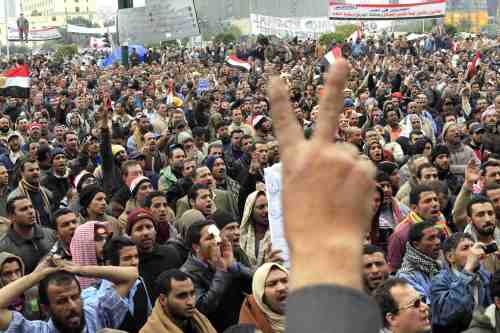DUBAI (AFP) ― The dramatic events in Tunisia and Egypt have pushed Arab leaders to promise political and economic reforms but the momentum for change now hinges on the outcome of the Egyptian uprising, analysts say.
“In one month, the Arab world has changed more than it had done in years,” said Ziad Majed, a lecturer on the modern Middle East at the American University of Paris.
“Today, fear has changed sides: For decades, authoritarian regimes were maintained through repression ... Today, the regimes are afraid and want to avoid at all costs what happened in Tunisia and Egypt,” Majed said.
Tunisian president Zine El Abidine Ben Ali fled the country in mid-January after a wave of protests demanding his ouster.
These demonstrations spread, especially to Egypt, where angry protests calling for President Hosni Mubarak’s ouster have turned increasingly bloody.
Leaders across the Arab world have taken steps to prevent their own country from being the next in line.
Yemeni President Ali Abdullah Saleh, who has been in power since 1978 but is now faced with protests demanding he quit, announced Wednesday that he would not stand for another term.
“In one month, the Arab world has changed more than it had done in years,” said Ziad Majed, a lecturer on the modern Middle East at the American University of Paris.
“Today, fear has changed sides: For decades, authoritarian regimes were maintained through repression ... Today, the regimes are afraid and want to avoid at all costs what happened in Tunisia and Egypt,” Majed said.
Tunisian president Zine El Abidine Ben Ali fled the country in mid-January after a wave of protests demanding his ouster.
These demonstrations spread, especially to Egypt, where angry protests calling for President Hosni Mubarak’s ouster have turned increasingly bloody.
Leaders across the Arab world have taken steps to prevent their own country from being the next in line.
Yemeni President Ali Abdullah Saleh, who has been in power since 1978 but is now faced with protests demanding he quit, announced Wednesday that he would not stand for another term.

He also postponed controversial elections due to have been contested in April, while announcing measures against unemployment and the extension of social security coverage.
However, the opposition has kept up the pressure, with tens of thousands of protesters turning out on Thursday in Sanaa to demonstrate against his rule.
In Jordan, King Abdullah II sacked the government Tuesday after weeks of protests and chose a new premier to carry out “true political reforms,” although the Islamist opposition slammed his choice as “not a man of reforms.”
In Syria, where activists called on Facebook for “a day of anger” after Friday prayers, President Bashar al-Assad said that “we have to keep up with this change, as a state and institutions,” in an interview with a U.S. newspaper.
The Moroccan government said it will maintain subsidies on basic commodities, while Algerian President Abdelaziz Bouteflika announced Thursday that a 19-year state of emergency would be lifted “in the very near future.”
And Bahraini’s Trade and Industry Minister Hassan Fakhru has said the government would keep in place subsidies on basic foodstuffs in the Gulf kingdom, where oil production is dwindling.
“The regimes are showing signs of openness and acceptance to demands that they have refused for decades for fear of losing control,” Majed said.
“The simple threat of angry protests in Jordan or in Yemen had more political consequences than classic activism in past years,” the regional analyst said.
But if Mubarak’s regime crushes the uprising in central Cairo’s Tahrir Square, in a Middle East version of China’s Tiananmen Square, Arab heads of state could be encouraged not to make concessions, analysts say.
“It really depends on whether Mubarak survives this wave of protest,” said Emile Hokayem, an analyst with the Manama-based International Institute for Strategic Studies-Middle East.
“I think Arab states will react differently if there is a regime change in Egypt in the coming days or if there will simply be a change within the regime,” Hokayem said.
“If Mubarak does not step down immediately, they will think it’s not necessary to make huge concessions on the political front and that there is a way to maneuver your way out of the protests,” he said.
The reforms pledged in Jordan and Yemen “could be only cosmetic changes, we cannot speculate. We have to wait for the outcome of what will happen in Egypt,” he added.
“The Arab regimes have two examples of crisis management,” said Sophie Pommier, a lecturer at Sciences Po Paris university.
Tunisia was “where the government fell quickly, and Egypt, where the regime has combined repression, false concessions, promises, fear of chaos and false changes of leadership,” she said.
“Each country will have to choose between the two models according to their own circumstances, but some could opt for very strong repression,” Pommier said.
Ziad Majed said change was still inevitable. “If Mubarak, the police and the regime loyalists succeed in crushing the protesters in Tahrir Square, this will slow reforms, but it will not stop an irreversible movement.”


















![[Today’s K-pop] BTS pop-up event to come to Seoul](http://res.heraldm.com/phpwas/restmb_idxmake.php?idx=642&simg=/content/image/2024/04/17/20240417050734_0.jpg&u=)